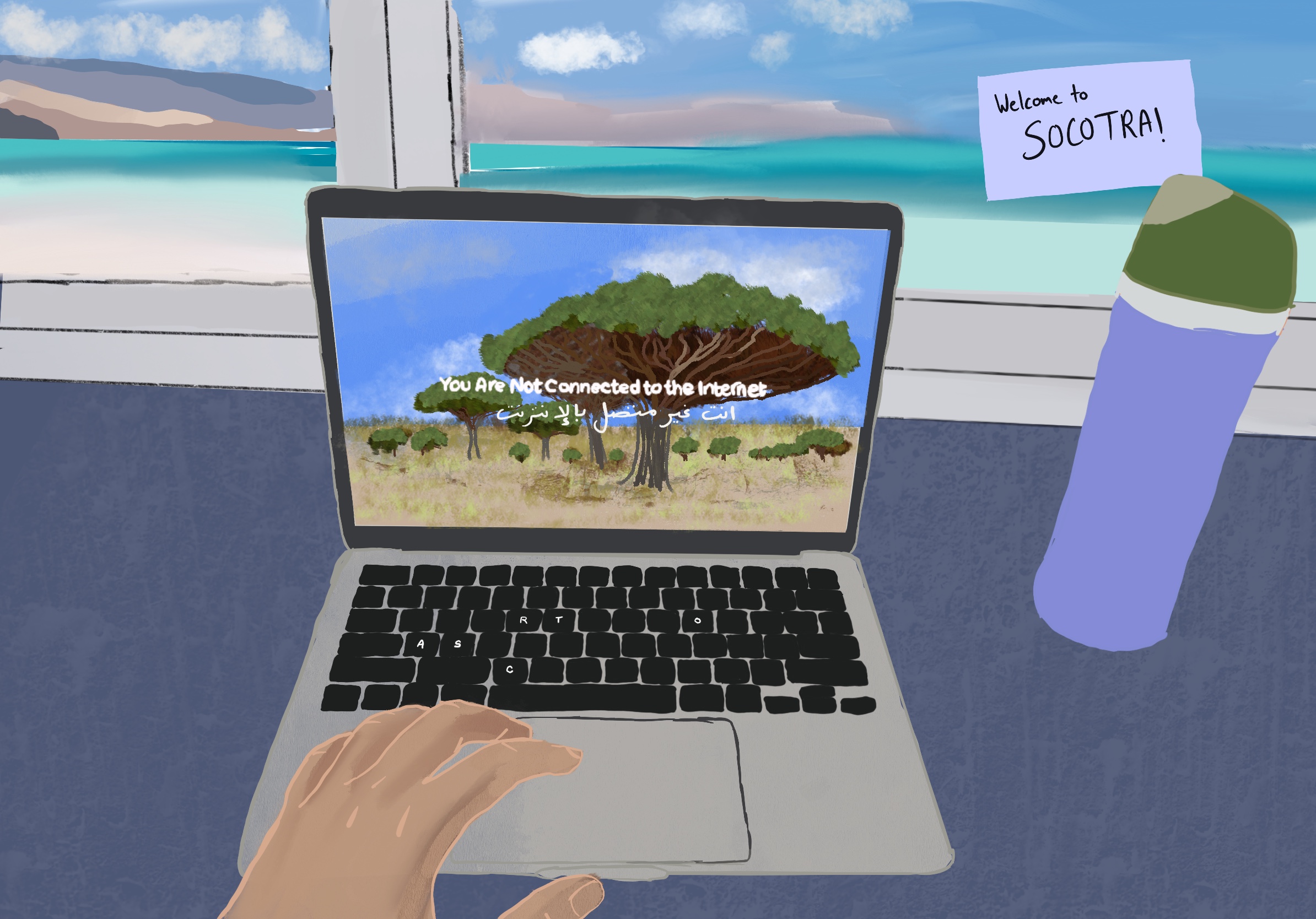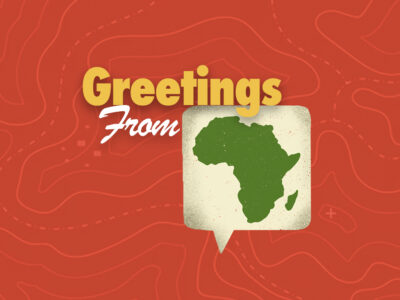
Image by Noran Morsi for Global Voices.
By Abdel Kareem Ben Qablan Al Socotri
This article is part of a series examining free expression and information access in civic spaces across six language communities in the MENA region.
In the turbulent Yemeni seas, the ancient Socotri language fades amid the surge of Arabic dominance, the enduring war in Yemen since 2015, and the shifting winds of power in the region.
The Socotra archipelago has long weathered the tides of exclusion and isolation amid shifting regimes in Yemen. Socotra emerges as a notable victim of political gambles, casting shadows over its people and language. The fog of marginalization has obscured Socotra's cultural identity and hindered its linguistic progress. Amid these challenges, the Socotri people grapple with sudden technological openness.
Despite the Socotris commitment to their native language, the absence of essential technological services like accessible internet restricts their expression, negatively impacting the survival of the Socotri language.
Yet, internet-less isolation has safeguarded the archipelago’s linguistic and cultural legacy for millennia. The swift, unplanned technological leap, driven by political shifts and the presence of the United Arab Emirates (UAE) became a double-edged sword for Socotris, shrouding linguistic and cultural landmarks.
What is the Socotri language, and where is it spoken?

Map by Gerald J. Coleman from the Central Intelligence Agency (CIA), in CIA World Factbook 2015. Accessed on Wikimedia commons. Public domain.
The Socotra archipelago, a living natural and historical museum, stands gracefully as a colossal ship in the Indian Ocean. Its strategic location connects the Middle East, Asia, and Africa, serving as a crucial passage for oil tankers.
Comprising four main islands adorned with natural and rare fauna, the archipelago attained UNESCO World Heritage status in 2008. Socotri culture is rich with myths, like being the home of the mythical phoenix, crafting its nest from cinnamon sticks, cardamom, cloves, and saffron.
The Socotris, an Indigenous ethnic group affiliated with the Mahra Qahatani tribe, proudly speak their ancestral language, Socotri, alongside Arabic. Their estimated population is around 71,000 speakers, according to Ethnologue.
Ahmed Al-Ramli, a Socotri heritage and history researcher, defines Socotri as “an unwritten oral Semitic language,” highlighting unique features like the “lateral Sheen” or the “third Seen,” absent in many Semitic languages.
Often mistaken for a variety of Arabic, Socotri is officially classified as Afro-Asiatic, Semitic, and belonging to the Southern Arabian languages family.
Despite these distinctions, Socotri lacks official recognition as a language in Yemen, resulting in its classification as a dialect rather than a distinct language.
In a conversation with Global Voices about acknowledging Socotri as a language rather than a dialect, Saleh Al-Hajjar, former cultural advisor to Socotra Governorate, said:
Every language has nouns, verbs, and articles. Socotri goes beyond, including verb conjugations, sources, various plurals, names of time, place, exaggeration, not to mention its rich literature, and extensive poetic compositions rivaling the pre-Islamic Mu'allaqat.
What is the current state of the technological divide in Yemen?

Socotra. Photo By blackseav, Wikimedia commons. CC BY 3.0.
Since 2015, Yemen has been in a devastating war between the Saudi and UAE-led coalition and Houthi rebels aligned with late president Ali Abdullah Saleh, who relinquished power after the 2011 Arab Spring protests and was assassinated by the Houthis in 2017 for changing his mind and advocating for dialogue with Saudi Arabia.
The UN has deemed the Yemen crisis world’s worst global humanitarian catastrophe, resulting in tens of thousands of civilian casualties, displacing 3.3 million, and subjecting 80 percent of the population to famine, malnutrition, and disease.
According to Access Now on June 25, 2020:
The brutal realities of the war are reflected in the internet and telecommunications infrastructure. It has become a battleground for exerting control, with authorities connecting or disconnecting the population to serve a military objective. As a result, millions of Yemenis have been deprived of their right to communicate, to access and exchange information, and importantly, to share their reality and lived experiences.
The Yemeni Policy Center confirmed that numerous websites have been blocked, and communication infrastructure targeted since the war began. The blockade on Yemen left telecommunication companies unable to maintain or upgrade communication facilities.
In early January 2022, sabotage damaged an underwater cable, resulting in an 80 percent reduction in internet capacity, affecting 28 million Yemenis. Sabotage, censorship, and ongoing internet disruptions isolate Yemen from the global community.
How does the absence of internet impact the documentation and dissemination of Socotri?

Socotra Island. Photo by Rod Waddington from Flickr. CC BY-SA 2.0.
Digital rights are crucial for Socotris, but the absence of basic internet access severely limits their freedom of expression, influencing the language's development, documentation, and preservation. A looming threat to the Socotri language lies in the scarcity of documented literary works, predominantly preserved in the minds of the elder Socotris.
As of the start of 2022, the internet penetration rate in Yemen was 26.7 percent, meaning 22.59 million out of 33 million people in Yemen lack internet access.
In a conversation between Socotri intellectuals and Global Voices, Skander Mohammed Althani, General Director of the Information Technology Foundation in Socotra, highlighted that the lack of internet is not the sole obstacle to language dissemination. He stressed that languages spread before the information technology revolution.
He highlighted the importance of transitioning from oral to written form, noting that, after this crucial step, technology can contribute to the global dissemination of Socotri.
He also emphasized how the absence of accessible internet in Socotra undermines the arguments of language enthusiasts and experts advocating for the recognition of Socotri as a distinct language, rather than merely a dialect. This absence has broader implications, extending beyond language alone:
In this era, technology serves as the conduit for people's voices to reach decision-makers. The current state of fixed internet service in Socotra, introduced in 2010, inadequately serves the Socotri people, lagging far behind the global information and technology revolution.
He believes the high cost is attributed to linking Socotra's communications to the central hub through satellites, making it an exceedingly expensive service.
Socotri academic, Dr. Ahmed Terbahi, supports this view, emphasizing that, “The absence of internet among Socotris hinders the documentation and preservation of the language, impacting its unique cultural heritage and usage.” He adds:
The internet's inadequacy, with service data not meeting people's needs, coupled with the lack of internet service in most areas of Socotra and disproportionately high costs compared to the general income, are the main reasons for the limited spread of the Socotri language.
Socotra's Cultural Affairs Consultant, Saleh Al-Hajjar, added:
The absence of technology hinders the Socotris’ ability to create content and print books, contributing to a lack of foundational knowledge. If present, this knowledge could help leverage modern technology to identify letters and understand the unique phonetics of the Socotri language. Technology's presence in the archipelago is an urgent necessity for the spread of the language.
How do linguistic challenges affect Socotris’ freedom of expression?

Dragon Blood Tree, Socotra. Photo by Rod Waddington. Flickr. CC BY-SA 2.0 DEED.
The heartbeat of Socotri culture still resonates but it is on the brink of extinction due to consistent neglect by successive Yemeni governments. Critical resources required for the inclusion of Mahri and Socotri languages in educational curricula are glaringly absent. Furthermore, there is a palpable dearth of support for the documentation and preservation of Socotri's artistic, cultural, literary, and linguistic legacy.
Compounding this cultural erosion is the stark absence of initiatives to safeguard the archipelago's unique environment. Unchecked and unplanned construction has taken a toll on the islands, further exacerbating the threats faced by Socotri culture.
The geographical isolation of Socotra and its self-contained nature preserved the ancestral language. Children learn it at home before acquiring Aabic, the official language in school.
However, the recent shift in the archipelago's lifestyle, a consequence of war-induced migrations and the UAE intrusion, has cast a spell of change. Controversially taking control of the island in 2018, the UAE connected the island to its network in 2020, replacing the Yemeni internet network. In 2023, the UAE further severed the Yemeni landline phone service and mobile network, favoring the UAE's telecommunications network.
The Socotrans express their anxieties regarding the impact of these changes on their culture and language.
Professor Omar Suleiman bin Qublan, the Director General of the Socotra Culture Office, in conversation with Global Voices, expressed these concerns, stating:
Concerns loom over the Socotri language as island's residents mingle with outsiders, especially city-bound migrants. These shifts contribute to the gradual erosion of identity, heritage, and Socotran culture, as cultures blend and expressions intertwine. Newcomers face challenges conversing in Socotri, thereby impacting its usage, especially in the key urban centers of the archipelago.
Against this backdrop, young intellectuals and enthusiasts responded to the perceived threat to their language, identity, and way of life by establishing the Socotri Language Center for Studies and Research on May 9, 2023. This followed the Southern Consultative Meeting in the capital, Aden, officially recognizing Mahri and Socotri languages in their respective regions.
Journalist Abdulrahman Jassfi believes that the Socotri Language Center will help preserve the language, especially if it is included as a subject in elementary school.
Amidst challenges, Socotri faces extinction but thrives on its people's determination. In the delicate balance between tradition and modernity, Socotri's fate is uncertain. The narrative emphasizes the need for recognition, preservation, and adaptation, echoing the resilient spirit of a community committed to ensuring Socotri's unique melody endures through time.

